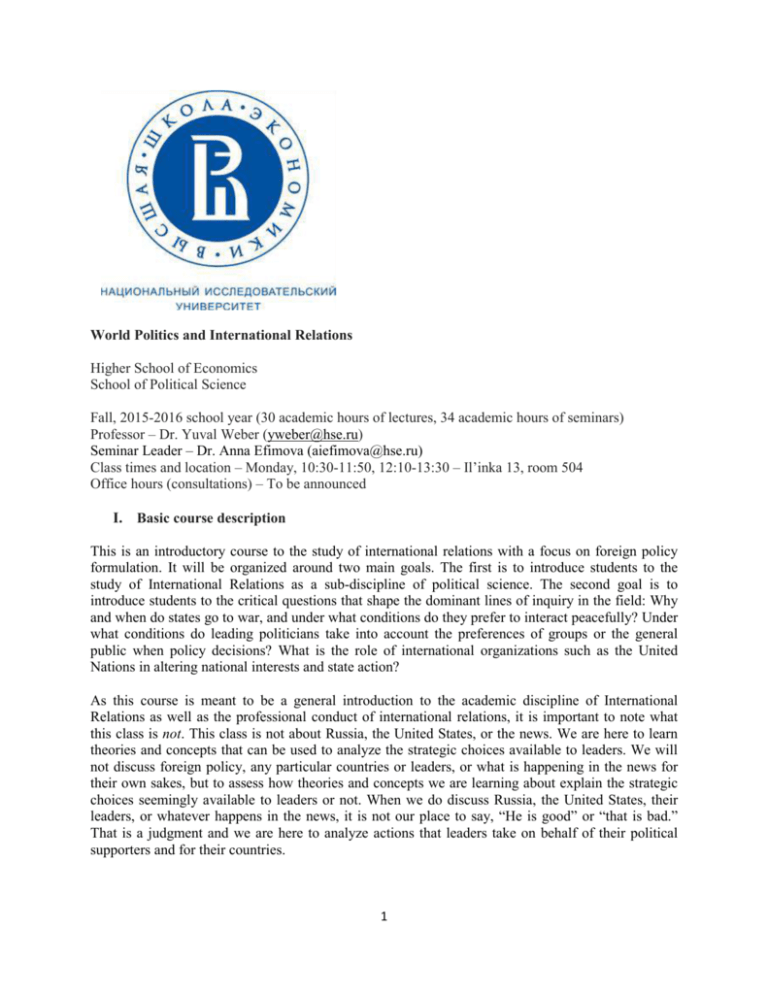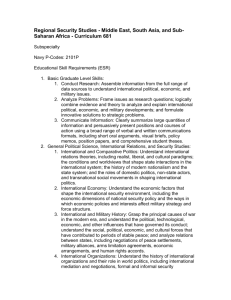
World Politics and International Relations
Higher School of Economics
School of Political Science
Fall, 2015-2016 school year (30 academic hours of lectures, 34 academic hours of seminars)
Professor – Dr. Yuval Weber (yweber@hse.ru)
Seminar Leader – Dr. Anna Efimova (aiefimova@hse.ru)
Class times and location – Monday, 10:30-11:50, 12:10-13:30 – Il’inka 13, room 504
Office hours (consultations) – To be announced
I. Basic course description
This is an introductory course to the study of international relations with a focus on foreign policy
formulation. It will be organized around two main goals. The first is to introduce students to the
study of International Relations as a sub-discipline of political science. The second goal is to
introduce students to the critical questions that shape the dominant lines of inquiry in the field: Why
and when do states go to war, and under what conditions do they prefer to interact peacefully? Under
what conditions do leading politicians take into account the preferences of groups or the general
public when policy decisions? What is the role of international organizations such as the United
Nations in altering national interests and state action?
As this course is meant to be a general introduction to the academic discipline of International
Relations as well as the professional conduct of international relations, it is important to note what
this class is not. This class is not about Russia, the United States, or the news. We are here to learn
theories and concepts that can be used to analyze the strategic choices available to leaders. We will
not discuss foreign policy, any particular countries or leaders, or what is happening in the news for
their own sakes, but to assess how theories and concepts we are learning about explain the strategic
choices seemingly available to leaders or not. When we do discuss Russia, the United States, their
leaders, or whatever happens in the news, it is not our place to say, “He is good” or “that is bad.”
That is a judgment and we are here to analyze actions that leaders take on behalf of their political
supporters and for their countries.
1
II. Course Materials
The reading material for this course will be made available through three primary formats.
First, the following required books will be made available to you:
Jeffry A. Frieden, David A. Lake, and Kenneth A. Schultz. 2010. World Politics: Interests,
Interactions, and Institutions. New York: Norton. (Hereafter FLS in the syllabus.)
Daniel A. Drezner. 2011. Theories of International Politics and Zombies. Princeton: Princeton
University Press.
Second, additional readings in .pdf or .doc format will be made available to you online to download.
III.Grading
There will be four sets of requirements for this course.
First, you will be expected to attend class, participate in discussions, and complete regular
quizzes. Our class format necessarily creates mutual obligations among students to come prepared to
discuss both the readings and the lecture materials. If only a few people in a group or the class are
regularly doing the reading and prepared for your simulation work, our discussions will stumble as
the bulk of students rely on a minority to carry them. Such a situation penalizes those students doing
the readings as they then are pushed to shoulder more responsibility in class. To avoid this situation
while fostering a stimulating and productive intellectual environment in class, your attendance
and participation will be tracked daily throughout the semester with two mechanisms—random
quizzes and sign-in attendance sheets. The quizzes will be drawn from the reading materials
assigned for that day and the previous lectures. [Participation]
Second, given the nature of the readings in English, you will be assigned the task of critiquing
the assigned readings in a seminar format. The seminar leader will expect you to be able to
demonstrate that you have done the readings by performing such tasks as summarizing the main
arguments, critiquing an author’s claims, drawing out policy implications, suggesting how an
author’s argument may apply to another issue area, or highlighting similarities and differences with
other readings. [Critiques]
Third, you will take 3 tests based on the classroom material. [Tests]
Fourth, you will complete a final project. [Final Project]
Please note: there is no comprehensive final exam.
•
•
•
•
Lecture Participation: attendance and quizzes 20%
Seminar Participation: 25%
Tests: 45% (15% x3)
Final Project: 10%
2
IV. Lecture Course Schedule
Major Changes to the syllabus – While most of the syllabus is set, I am always happy to spend more
time on subjects students are particularly interested in exploring. For this reason I leave the last two
classes towards the end of the semester open so that we can cover all of the planned and spontaneous
material.
Minor Changes to the syllabus – I may make minor changes to the syllabus. These will be announced
at least a week in advance.
Optional readings – Optional readings are just that: optional. You do not have to read them and you
will not be tested upon them. They are there if you are interested in the subject. Readings will be
available online.
1. Introduction to class and International Relations, the discipline
FLS, Introduction and Chapter 1 (pgs. ix-38; skim Ch. 1, which is just a brief summary of world
history and will be review for some or all students)
Drezner, Theories of International Politics and Zombies. Don’t worry, it’s short and funny.
2. Anarchy, Hierarchy, and Levels Of Analysis
Singer, David J. “The Levels-of-Analysis Problem in International Relations,” World Politics 14
(1961): 77-92.
Kenneth Waltz, “The Anarchic Structure of World Politics,” in Robert J. Art and Robert Jervis,
International Politics, 9th edition, pp. 29-49. New York: Pearson Longman.
Lake, David A. "Escape from the state of nature: Authority and hierarchy in world politics."
International Security 32.1 (2007): 47-79.
Optional:
Helen Milner, “The Assumption of Anarchy in International Relations Theory: A Critique,” Review
of International Studies Vol. 17, No. 1 (January 1991), pp. 67-85.
3. The State and Political Institutions
Mancur Olson, Power and Prosperity: Outgrowing Communist and Capitalist Dictatorships (New
York: Basic Books, 2000): pp. 1-43 (Ch. 1-2).
Charles Tilly in Bringing the State Back In, edited by Peter Evans, Dietrich Rueschemeyer, and
Theda Skocpol (Cambridge: Cambridge. University Press, 1985): pp. 169-187.
Patrick McDonald, Toward a Bargaining Framework of International Politics (manuscript).
Optional:
Albert Hirschman, Exit, Voice and Loyalty: Responses to Decline in Firms, Organizations, and
States (Cambridge, MA: Harvard University Press, 1970): pp. 1-105.
3
4. Interests and Preferences
FLS Ch. 2
Kuran, Timur. “Now out of never: The element of surprise in the East European revolution of 1989.”
World politics 44.01 (1991): 7-48.
5. Anarchy’s Problems & Solutions: Security Dilemma, Alliances, and International
Institutions
Robert Jervis. 1978. Cooperation Under the Security Dilemma. World Politics 30(2): 167-214.
Glenn Snyder. 1984. The Security Dilemma in Alliance Politics. World Politics 36(4): 461-495.
Charles A. Kupchan and Clifford A. Kupchan. 1995. The Promise of Collective Security.
International Security 20(1): 52-61.
FIRST TEST
6. Paradigmatic Approaches I: Realism
John Mearsheimer, “Structural Realism,” in Dunne, Kurki, and Smith, editors, International
Relations Theories: Discipline and Diversity (Oxford: Oxford University Press, 2006), 71‐88;
Robert Jervis, “Realism in the Study of World Politics,” International Organization, Vol. 52 (1998):
971‐992.
Jeffrey Legro and Andrew Moravcsik, “Is Anybody Still a Realist?” International Security Vol. 24
(1999): 5‐55 and the correspondence, “Brother Can You Spare a Paradigm? (Or was Anybody Ever a
Realist,” International Security Vol. 25 (2000): 165‐193.
7. Paradigmatic Approaches II: Liberalism
Peter Gourevitch, “The Second Image Reversed: The International Sources of Domestic Politics,”
International Organization, Vol. 32 (1978): 881‐912;
Robert Putnam, “Diplomacy and Domestic Politics: The Logic of Two‐Level Games," International
Organization, Vol. 42 (1988): 427‐460;
Andrew Moravcsik, “Taking Preferences Seriously: A Liberal Theory of International Relations,”
International Organization, Vol. 51 (1997): 513‐553;
Optional:
James Fearon, “Domestic Political Audiences and the Escalation of International Disputes,”
American Political Science Review, Vol. 88 (1994): 577‐592;
Andrew Moravcsik, “The New Liberalism,” in Christian Reus-Smit and Duncan Snidal, eds., The
Oxford Handbook of International Relations (pp. 234-254).
John R. Oneal and Bruce Russett, Triangulating Peace: Democracy, Interdependence, and
International Organizations (New York: W. W. Norton, 2001).
4
8. Paradigmatic Approaches III: Constructivism and Norms
Wendt, Alexander. "Anarchy is what states make of it: the social construction of power politics."
International Organization 46.02 (1992): 391-425.
Alastair Johnston, “Thinking About Strategic Culture,” International Security, Vol. 19 (1995): 32‐64.
Nina Tannenwald. 1999. “The Nuclear Taboo: The United States and the Normative Basis of Nuclear
Non-Use,” International Organization, Vol. 53, No. 3, pp. 433-468.
Optional:
Ian Hurd, “Legitimacy and Authority in International Politics,” International Organization ̧ Vol. 53
(1999): 379‐408.
John Mueller, The Remnants of War (Ithaca: Cornell University Press, 2004).
9. Causes of War
Blainey, Geoffrey. Causes of War. Simon and Schuster, 1988. Skim 3-34. Read 35-126.
10. Bargaining Theory: When and Why Wars Occur
FLS Ch. 3
Dan Reiter, “Exploring the Bargaining Model of War,” Perspectives on Politics 1, no. 1 (2003): pp.
27-47.
Barbara Walter, “Bargaining Failures and Civil War,” Annual Review of Political Science 12 (2009):
243-261.
Optional:
James Fearon, “Rationalist Explanations for War,” International Organization 49 (Summer 1995):
379-414. (**Note: a simplified but complete version of this model is presented in the textbook, but it
is good to understand the original paper.**)
James D. Fearon and David D. Laitin, “Ethnicity, Insurgency, and Civil War,” American Political
Science Review 97, 1 (March 2003): 75-90.
SECOND TEST
11. Democratic Peace Theory
Michael Doyle, “Kant, Liberal Legacies, and Foreign Affairs, Part I,” Philosophy and Public Affairs,
Vol. 12 (1983): 205‐235.
John Owen, “How Liberalism Produces Democratic Peace,” International Security, Vol. 19 (1994):
87‐125.
5
Bruce Russett and John Oneal, “The Kantian Peace: The Pacific Benefits of Democracy,
Interdependence, and International Organizations, 1885‐1992,” World Politics. Vol. 52 (1999): 1‐37.
Optional:
Sebastian Rosato, “The Flawed Logic of Democratic Peace Theory,” American Political Science
Review, Vol. 97 (2003): 585‐602;
Michael Desch, “Democracy and Victory: Why Regime Type Hardly Matters,” International
Security, Vol. 27 (2002): 5‐47.
12. War and Domestic Politics
FLS Ch. 4
Peter Feaver, “Civil-Military Relations,” Annual Review of Political Science 2 (1999): 211-241.
Weeks, Jessica L. 2008. “Autocratic Audience Costs: Regime Type and Signaling Resolve.”
International Organization 62, 1: 35-64.
Optional:
Kenneth A. Schultz. 1999. “Do Democratic Institutions Constrain or Inform?,” International
Organization 53(2): 233-266.
Bueno de Mesquita, Bruce, James D. Morrow, Randolph Siverson, and Alastair Simth. 1999. “An
Institutional Explanation of the Democratic Peace.” American Political Science Review 93: 791-807.
Narizny, Kevin. 2003. “Both Guns and Butter, or Neither: Class Interests in the Political Economy of
Rearmament.” American Political Science Review 97, 2: 203-220.
Snyder, Jack. 1991. Myths of Empire: Domestic Politics and International Ambition. Ithaca: Cornell
University Press. Chapters 1 and 2.
13. International Institutions and War
FLS Ch. 5
Chapman, Terrence and Dan Reiter. “The United Nations Security Council and the Rally ‘Round the
Flag Effect,” Journal of Conflict Resolution 48, no. 6 (December 2004): pp. 886-909.
Michael Glennon, “Why the Security Council Failed,” Foreign Affairs 82, no. 3 (May/June 2003):
pp. 16-35
Lisa L. Martin, “Self-Binding,” Harvard Magazine 107, no. 1 (September-October 2004): pp. 33-36
14. Post-War Settlements: Structure and Peacekeeping
G. John Ikenberry, After Victory: Institutions, Strategic Restraint, and the Rebuilding of Order after
Major Wars (Princeton: Princeton University Press, 2001): pp. 1-79.
Fortna, Virginia Page. "Does peacekeeping keep peace? International intervention and the duration of
peace after civil war." International studies quarterly 48.2 (2004): 269-292.
6
15. Future of International Politics
THIRD TEST
Reading to be announced.
V.
Seminar Course Schedule
To be provided by Anna Efimova
7









